五年级下册英语第一单元知识点整理
Unit1Myday(讲义)-人教PEP版英语五年级下册(1)

PEP英语五年级下册Unit 1 知识梳理【单元语音归纳】一、单词:eat breakfast[ˈbrekfəst]吃早餐 a.m上午have···class 上···课p.m 下午play sports 进行体育运动why 为什么exercise[ˈeksəsaɪz]活动;运动。
shop 去买东西;购物do morning exercises做早操work[wɜ:k] 工作eat dinner吃晚饭last [lɑ:st]上一个的;刚过去的clean my room 打扫我的房间sound[saʊnd] 听起来好像go for a walk 散步also[ˈɔ:lsəʊ] 还;也go shopping 去买东西;购物busy[ˈbɪzi] 忙的take学习;上(课)need[ni:d] 需要dancing[ˈdɑ:nsɪŋ] 舞蹈play 戏剧;剧本take a dancing class 上舞蹈课letter[ˈletə(r)] 信when 什么时候live[lɪv] 居住after 在(时间)后island[ˈaɪlənd] 岛start 开始always[ˈɔ:lweɪz] 总是;一直usually[ˈju:ʒuəli] 通常地cave[keɪv] 山洞Spain[speɪn] 西班牙go swimming 去游泳late[leɪt] 晚;迟win[wɪn] 获胜二、词语1. eat breakfast 吃早饭2. have…class 上……课3. play sports 进行体育活动4. exercise活动;运动5. do morning exercises 做早操6. eat dinner 吃晚饭7. clean my room 打扫我的房间8. go for a walk散步9. go shopping 去买东西;购物10. take 学习;上(课)11. dancing 跳舞;舞蹈12. take a dancing class 上舞蹈课13. go swimming去游泳【重点句型再现】1. 询问对方什么时间做某事的句型及答语—When do you finish class in the morning? 你们上午的课几点结束?—We finish class at 1 o’clock. 我们一点钟结束上午的课。
PEP五年级英语下册Unit1-6重点知识小结

Unit 1 This Is My Daydo morning exercises晨练eat breakfast吃早饭have english class上英语课play sports进行体育运动eat dinner吃晚饭when什么时候evening夜晚;晚上get up起床at在……点钟usually通常;一般noon中午climb mountains爬山go shopping购物;买东西play the piano弹钢琴visit grandparents看望祖父母go hiking去远足weekend周末often经常sometimes有时候话题1:日常生活时态:一般现在时1.When do you do morning exercises? 你什么时候做早操?I usually do morning exercises at 8:00. 我经常八点钟做早操。
(I usually get up at 12:00 at noon . 我经常在中午十二点起床。
) 2.When do you eat dinner ? 你什么时候吃晚餐?I eat dinner at 7:00 in the evening. 我在晚上七点种吃晚餐。
3.When is the best time to go to Beijing? Fall. 最好在什么时候去北京?秋天。
Unit 2 My Favourite Seasonspring春天summer夏天fall秋天winter冬天season季节which哪一个best最;极swim游泳fly kites放风筝skate滑冰make a snowman堆雪人plant trees种树why为什么because因为sleep 睡觉话题2:季节时态:一般现在时1.Which season do you like best ? I like spring best.(Spring.)你最喜欢是什么季节?我最喜欢春季。
(完整版)人教版五年级英语下册Unit1知识点汇总

Unit1 My day 知识整理△话题:谈论每天的活动及时间安排△词汇:do morning exercises(做早操)eat breakfast/lunch/dinner(吃早餐/午餐/晚餐)have...class(上…课),play sports(做运动)clean my room(打扫我的房间),go for a walk (散步) go shopping(购物),take a dancing class(上舞蹈课)△拓展词汇:get up(起床), go to bed(上床睡觉)wash my clothes(洗我的衣服), watch TV(看电视)do homework(做作业), play music(演奏音乐)cook dinner(煮晚餐), at home(在家)in the morning(在上午),in the afternoon(在下午)in the evening(在晚上),at night(在半夜)△句型:①询问做某事在几点When do you+动词原形(短语)+其他?—— At +时间—— I(+频度副词)+动词原形(短语)+at+时间。
例句:When do you get up in the morning?—— At 7:30.—— I often get up at 7:30.②询问周末的活动安排What do you often do on the weekend?I often (always/sometime/usually) +…(周末的活动)+with … (某人)+on the weekend (on Saturdays/on Sundays ).例句:What do you do on the weekend ?I often take a dancing class with my friend on Sundays. △知识点:1:注意介词的搭配at +具体时间(几点)/night/home at 9 o ’clock in +国家/季节 in Spainon +星期 on the weekend/on Sundays with +人 with my father/mother/friend 2:表示时间频率词的区别always 表示总是,一直;usually 表示经常,通常;often 表示经常,常常;sometimes 表示有时,间或。
五年级下册英语素材-unit 1 keeping healthy 知识点总结 人教新起点版

新起点英语五年级(下)教学总结Unit 1 Keeping Healthy一.单词1.too much 太多常用作副词或代词,也可作形容词修饰不可数名词eg:We should eat too much fruit.He shouldn’t watch too much TV.much too 太常作副词,后接形容词或副词eg:It is much too much cold.He drove much too fast.too many 太多常用作形容词,修饰可数名词复数eg:They built too many buildings last year.2.candy n. 糖果表“种类”可数 candies表“数量”不可数3.go to bed 去睡,就寝eg:It’s time for bed.It’s time to go to bed.4.early adj.早的 Adv.早地late adj. 晚的 adv.晚地,迟地eg:I didn’t catch the early bus this morning.(adj.)get up early (adv.)be late for school 上学迟到 (adj.)get up late 起床晚了 (adv.)be late to do 迟于做4.exercise n.运动,锻炼(不可数)take exercise 锻炼身体体操,练习(题)时(可数)do English exercises 做英语练习do eye exercises 做眼保健操v. 锻炼 eg:You should exercise every day.5.tired adj.困倦的,疲倦的be tired 疲劳的 feel tired 感到累 look tired 看起来累6.drink v.喝 drink water/tean.饮料7.before (prep.)在…之前 after 在…之后before breakfast before eating after school 8.Dirty adj.肮脏的 clear adj.干净的9.常见频率副词:always 总是 usually 通常 often 经常Sometimes 有时 seldom 很少 hardly 几乎不 never 从不,从未Once in a while 偶尔 once a week 一星期一次Twice a week 一星期两次 three times a week 一星期三次对频率副词提问用How often …?Eg:I sometimes go there. How often do you go there?10.have/get a stomachache/headache/toothache 胃痛/头痛/牙痛11.a lot of =lots of=plenty of+可数/不可数名词大量,许多12.sleep v. 睡觉 sleepy adj.困的,欲睡的 asleep adj.睡着的13.subject n.学科,科目14.mark n.分数 a good mark15.advice 建议(不可数) a piece of advice some advice16.more adj.(many,much的比较级)更多的,较多的Eg:More and more people are going in for sports.most adj.(many,much的最高级)最多的,最大的Eg:She has the most books in the class.17.health n. 健康 healthy adj.健康的 healthily adv.健康地keep/be/stay healthy=keep/be/stay in good health 保持健康healthy diet 均衡饮食,健康饮食healthy food 健康食品 junk food 垃圾食品二.语法情态动词:本身有一定词义,但不完整,不能独立做谓语,只能和实意动词(原型)一起构成谓语,表示说话人的态度,一般无人称和数的变化。
五年级下册英语第一单元知识点
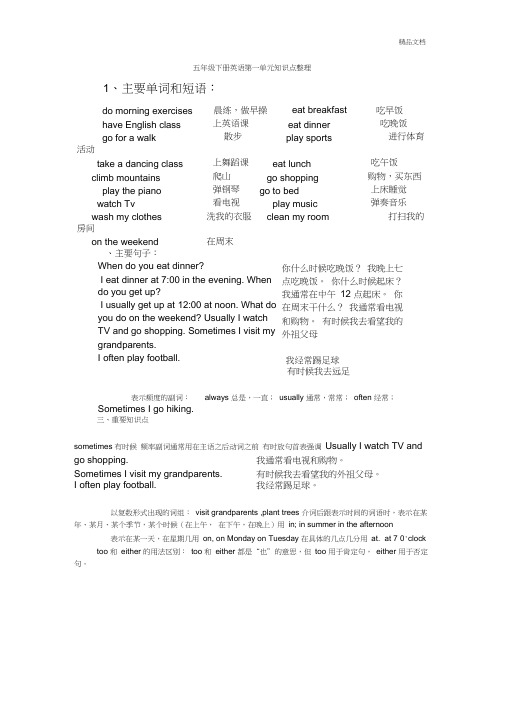
精品文档五年级下册英语第一单元知识点整理1、主要单词和短语:do morning exercises 晨练,做早操 eat breakfast 吃早饭 have English class 上英语课 eat dinner 吃晚饭 go for a walk散步play sports进行体育 活动take a dancing class 上舞蹈课 eat lunch 吃午饭climb mountains 爬山 go shopping 购物,买东西 play the piano 弹钢琴 go to bed 上床睡觉 watch Tv看电视 play music 弹奏音乐wash my clothes洗我的衣服clean my room打扫我的房间on the weekend在周末、主要句子:When do you eat dinner?I eat dinner at 7:00 in the evening. When do you get up?I usually get up at 12:00 at noon. What do you do on the weekend? Usually I watch TV and go shopping. Sometimes I visit my grandparents.I often play football.Sometimes I go hiking.三、重要知识点sometimes 有时候 频率副词通常用在主语之后动词之前 有时放句首表强调 Usually I watch TV andgo shopping.我通常看电视和购物。
Sometimes I visit my grandparents. 有时候我去看望我的外祖父母。
I often play football.我经常踢足球。
以复数形式出现的词组: visit grandparents ,plant trees 介词后跟表示时间的词语时,表示在某年、某月、某个季节,某个时候(在上午, 在下午,在晚上)用 in; in summer in the afternoon表示在某一天,在星期几用 on, on Monday on Tuesday 在具体的几点几分用 at. at 7 0'clocktoo 和 either 的用法区别: too 和 either 都是“也”的意思,但 too 用于肯定句, either 用于否定句。
人教PEP版五年级英语下册 Unit 1 My day 知识点清单

Unit 1 My day一、核心词汇1.动词: take 学习;上(课)2.名词: dancing跳舞;舞蹈exercise活动;运动3.短语: do morning exercises做早操eat breakfast吃早饭play sports进行体育运动eat dinner吃晚饭go for a walk散步go shopping去买东西;购物clean my room 打扫我的房间take a dancing class 上舞蹈课have … class 上……课二、了解词汇1.动词: start开始shop去买东西;购物work工作need需要live居住win获胜sound听起来好像2.名词: Spain西班牙play戏剧;剧本letter信island岛cave山洞;洞穴3.介词: after在(时间)后4.其他: when什么时候;何时late晚;迟 a.m.午前;上午p.m.午后;下午why为什么last上一个的;刚过去的also还;也busy 忙的5.拓展词汇——频率副词(1)定义: always, usually, sometimes等词叫作频率副词,用来表示动作发生的频率,但程度上有区别。
按频率大小可做如下排列: always > usually > sometimes(2)位置:频率副词一般放在主语之后、实义动词之前。
I always get up at 6:30. 我总是六点半起床。
I usually watch TV on the weekend. 我周末通常看电视。
(usually也可用于句首)I sometimes visit my grandparents. 有时我看望我的祖父母。
(sometimes也可以放在句首)6.短语:watch TV看电视eat lunch吃午饭go to bed上床睡觉go swimming去游泳 go home回家go to school去上学三、核心句型1.— When do you do morning exercises? 你什么时候做早操?— At 7 o’clock. 七点。
人教版五年级下册英语第一单元知识点
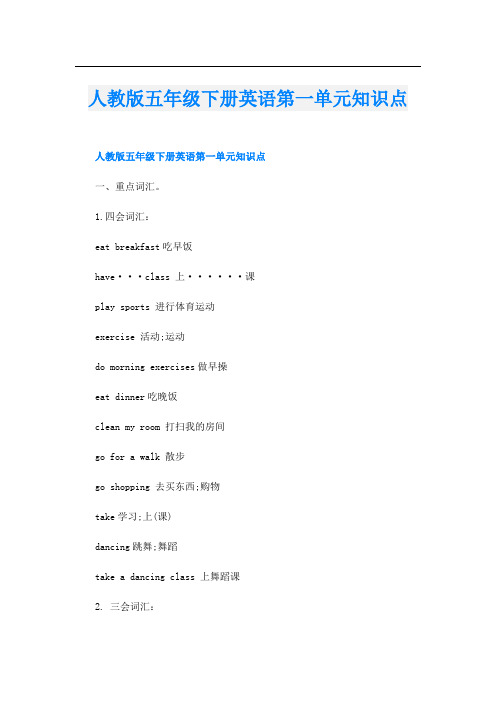
人教版五年级下册英语第一单元知识点人教版五年级下册英语第一单元知识点一、重点词汇。
1.四会词汇:eat breakfast吃早饭have···class 上······课play sports 进行体育运动exercise 活动;运动do morning exercises做早操eat dinner吃晚饭clean my room 打扫我的房间go for a walk 散步go shopping 去买东西;购物take学习;上(课)dancing跳舞;舞蹈take a dancing class 上舞蹈课2. 三会词汇:when什么时候 after 在(时间)后 start 开始 usually 通常地;惯常地Spain 西班牙 late 晚;迟a.m. 午前;上午p.m. 午后;下午why 为什么 shop 去买东西;购物 work 工作last 上一个的;刚过去的sound 听起来好像also 还;也 busy 忙的 need 需要 play 戏剧;剧本letter 信 live居住 island 岛always 总是;一直 cave 山洞;洞穴go swimming 去游泳 win 获胜二、其他日常活动。
get up起床eat lunch吃午饭go to bed 上床睡觉wash my face洗脸wash my clothes 洗我的衣服watch TV看电视play ping-pong打乒乓球play the pipa弹琵琶go swimming去游泳go running去跑步do homework 做作业do kung fu练武术play football踢足球play basketball打篮球三、频度副词。
always总是,一直(100%) usually通常(80%) often 经常(60%) sometimes(30%)有时四、疑问词。
五年级下册英语第一单元整理归纳
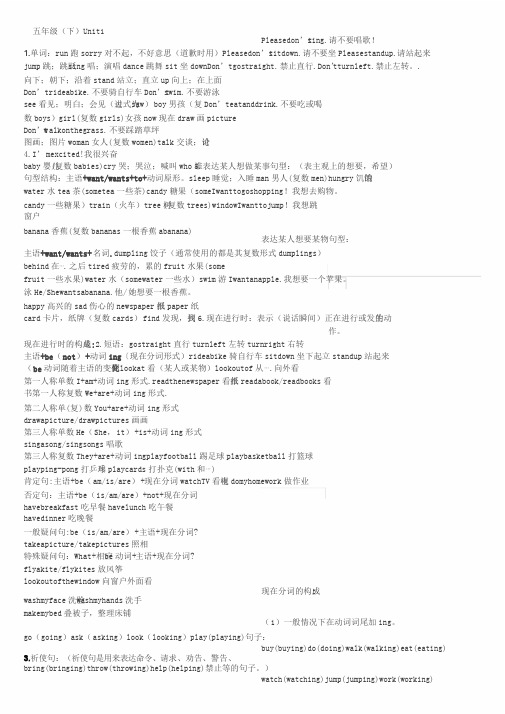
五年级(下)Unit1Pleasedon’s t ing.请不要唱歌!1.单词:run跑sorry对不起,不好意思(道歉时用)Pleasedon’s t itdown.请不要坐Pleasestandup.请站起来jump跳;跳跃s ing唱;演唱dance跳舞sit坐downDon’t gostraight.禁止直行.Don’tturnleft.禁止左转。
.向下;朝下;沿着stand站立;直立up向上;在上面Don’t rideabike.不要骑自行车Don’s twim.不要游泳s aw)boy男孩(复Don’t eatanddrink.不要吃或喝see看见;明白;会见(过去式为数boys)girl(复数girls)女孩now现在draw画pictureDon’w t alkonthegrass.不要踩踏草坪论图画;图片woman女人(复数women)talk交谈;讨4.I’mexcited!我很兴奋5.表达某人想做某事句型:(表主观上的想要,希望)baby婴儿(复数babies)cry哭;哭泣;喊叫who谁的句型结构:主语+want/wants+to+动词原形。
sleep睡觉;入睡man男人(复数men)hungry饥饿water水tea茶(sometea一些茶)candy糖果(someIwanttogoshopping!我想去购物。
candy一些糖果)train(火车)tree树(复数trees)windowIwanttojump!我想跳窗户banana香蕉(复数bananas一根香蕉abanana)表达某人想要某物句型:主语+want/wants+名词.dumpling饺子(通常使用的都是其复数形式dumplings)behind在⋯.之后tired疲劳的,累的fruit水果(somefruit一些水果)water水(somewater一些水)swim游Iwantanapple.我想要一个苹果。
【知识学习】五年级英语下册第一单元单词及重点句型汇总

五年级英语下册第一单元单词及重点句型汇总Unit1wordList单词表cleanmyroom(打扫我的房间)domorningexercises(晨练)goforawalk(散步)eatbreakfast(吃早饭)takeadancingclass(上舞蹈课)goshopping(购物;买东西)haveEnglishclass(上英语课)eatdinner(吃晚饭)playsports(进行体育运动)when(什么时候)evening(夜晚;晚上)getup(起床)at(在……点钟)weekend(周末)always(总是,一直)often(经常)sometimes(有时候)usually(通常;一般)Unit1mainsentences主要句型.whendoyougetup?(你什么时候起床?)---Ioftengetupat7o’clock.(我经常在7点钟起床。
)2.whendoyoustartclassinSpain?(你在西班牙什么时候开始上课?)---Usuallyat9o’clock.(通常在9点钟。
)3.whatdoyoudoontheweekend?(你在周末做什么?)---IoftenwatchTVandplayping-pongwithmyfather.(我经常看电视,也常和我爸爸打乒乓球。
)4.Iusuallywashclothes.SometimesIcookdinner.(我经常洗衣服。
有时候我会做晚餐。
)5.Thatsoundslikealotoffun.(那样听起来很有趣。
)Unit1myday一、根据所给中文意思写单词。
______________________________________________________(打扫我的房间)(散步)(吃晚饭)______________________________________________________(上舞蹈课)(上英语课)(购物;买东西)______________________________________________________(吃早饭)(进行体育运动)(晨练)二、根据问句写答句。
五年级下册英语第一单元知识点整1
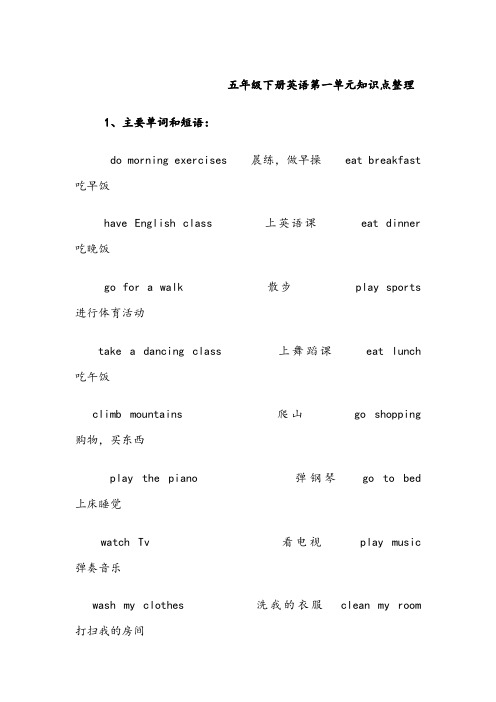
五年级下册英语第一单元知识点整理1、主要单词和短语:do morning exercises 晨练,做早操 eat breakfast吃早饭have English class 上英语课eat dinner 吃晚饭go for a walk 散步 play sports进行体育活动take a dancing class 上舞蹈课eat lunch 吃午饭climb mountains 爬山go shopping购物,买东西play the piano 弹钢琴go to bed 上床睡觉watch Tv 看电视play music 弹奏音乐wash my clothes 洗我的衣服clean my room 打扫我的房间on the weekend 在周末二、主要句子:When do you eat dinner 你什么时候吃晚饭I eat dinner at 7:00 in the evening. 我晚上七点吃晚饭。
When do you get up 你什么时候起床I usually get up at 12:00 at noon. 我通常在中午12点起床。
What do you do on the weekend 你在周末干什么Usually I watch TV and go shopping. 我通常看电视和购物。
Sometimes I visit my grandparents. 有时候我去看望我的外祖父母。
I often play football. 我经常踢足球。
Sometimes I go hiking. 有时候我去远足。
三、重要知识点表示频度的副词:always 总是,一直;usually 通常,常常;often 经常; sometimes 有时候频率副词通常用在主语之后动词之前有时放句首表强调Usually I watch TV and go shopping. 我通常看电视和购物。
五年级下册英语Unit1知识点
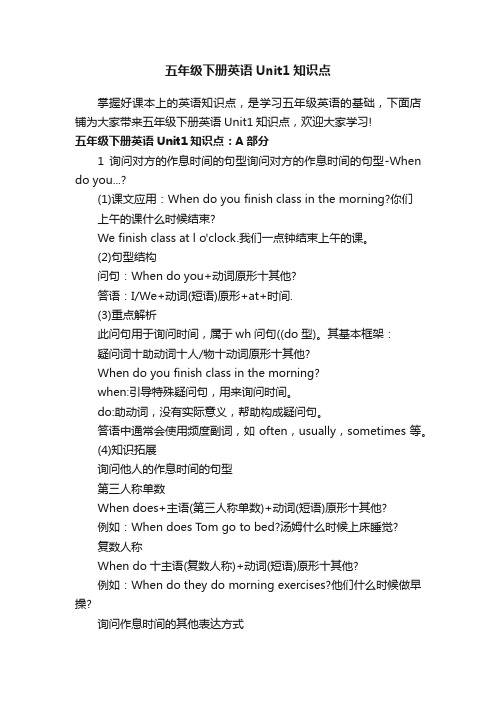
五年级下册英语Unit1知识点掌握好课本上的英语知识点,是学习五年级英语的基础,下面店铺为大家带来五年级下册英语Unit1知识点,欢迎大家学习!五年级下册英语Unit1知识点:A部分1询问对方的作息时间的句型询问对方的作息时间的句型-When do you...?(1)课文应用:When do you finish class in the morning?你们上午的课什么时候结束?We finish class at l o'clock.我们一点钟结束上午的课。
(2)句型结构问句:When do you+动词原形十其他?答语:I/We+动词(短语)原形+at+时间.(3)重点解析此问句用于询问时间,属于wh问句((do型)。
其基本框架:疑问词十助动词十人/物十动词原形十其他?When do you finish class in the morning?when:引导特殊疑问句,用来询问时间。
do:助动词,没有实际意义,帮助构成疑问句。
答语中通常会使用频度副词,如often,usually,sometimes等。
(4)知识拓展询问他人的作息时间的句型第三人称单数When does+主语(第三人称单数)+动词(短语)原形十其他?例如:When does Tom go to bed?汤姆什么时候上床睡觉?复数人称When do十主语(复数人称)+动词(短语)原形十其他?例如:When do they do morning exercises?他们什么时候做早操?询问作息时间的其他表达方式询问作息时间还可以用“What time do/does+主语十动词(短语)原形十其他?”句型。
例如:what time do you get up?你什么时候起床?2字母组合cl,pl在单词中的发音字母组合cl,pl在单词中的发音五年级下册英语Unit1知识点:B部分1询问对方周末做什么的句型询问对方周末做什么的句型-What do you do on the weekend?(1)课文应用:So What do you do on the weekend?那么你周末做什么?I often watch TV and play ping-pong with my father.我经常看电视、和我爸爸一起打乒乓球。
五年级英语下册知识点总结
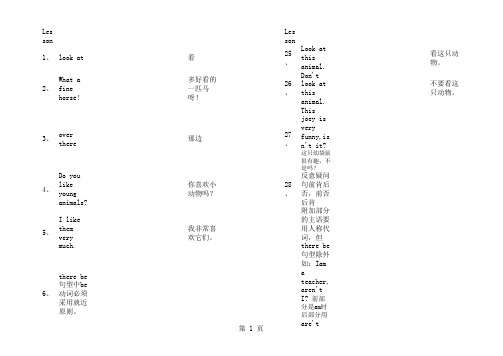
1、look at 看25、Look at this animal.看这只动物。
2、What a fine horse!多好看的一匹马呀!26、Don't look at this animal.不要看这只动物。
3、over there那边27、This joey is very funny,isn't it?这只幼袋鼠很有趣,不是吗?4、Do you like young animals?你喜欢小动物吗?28、反意疑问句前肯后否,前否后肯5、I like them very much.我非常喜欢它们。
附加部分的主语要用人称代词,但there be 句型除外6、there be 句型中be动词必须采用就近原则。
如:Iam a teacher,aren't I?前部分是am时后部分用are'tthere is +不可数名词(water milk) There will be a meeting,won't there?there is +可数名词单数回答时要前后一致。
there are +可数名词复数如:Yes,I am . No,I'm not.Lesson 2Lesson 67、What's this in English?这个用英语怎么说?29、Is this a tiger? Yes,it is. 这是只老虎吗?是的,它是。
8、It's a horse.它是horse.30、is that a lion? No,it isn't. 那是头狮子吗?不,它不是。
9、What do you call it in English?在英语中你们叫它什么呢?31、What can we call it?我们叫它什么?10、We call it a foal.我们叫它foal32、We can call it a cub.我们叫它cub。
五年级下册英语第一单元Unit1知识点总结

五四青年节01短语go toBeijing 去北京at the train station 在火车站want to 想要sit down 坐下stand up 起立go straight 直走ride bike 骑车look out of 向外看on the train在火车look at 看见draw a picture 画画read a book读书sing a song 唱歌have breakfast吃早点fly a kite 放风筝here you are 给你read thenewspaper 读报havefun 玩得高兴play with 跟…玩play cards 打牌go on atrip to Beijing去北京旅行get the tickets 买票how much 多少钱have a good trip一次美妙的旅行listen to music 听音乐02句子1.Please don‘t jump!不要跳2.A:What are you doing ?你在干什么?B:I’mreading a book.我正在读书。
3.A:Who is singing ?谁在唱歌?B:Thegirl is singing。
这个女孩在唱歌。
4.A:Who is hungry ?谁饿了?B:I’mhungry.我饿了。
5.A:Would you like some fruit? 你想要点水果吗?B:Yes,please/No,thanks.6.A:What would you like? 你想要点什么?B:I’d like some candy.我想要点糖果。
7. A:What is the baby doing ?这个婴儿在干什么?B:The baby is crying.这个婴儿在哭。
03语法1.完全形式don’t -do not 、I'm-I am、isn't-is not、can't-can not2.单三run-runs 、say-says3.there同音词their look看的动作see看的结果4.现在分词:do-doing、look-looking、draw-drawing、sing-singing、sit-sitting、play-playing、talk-talking 、sleep-sleeping、have-having、drive-driving5.反义词:ask-answer、man-woman、sit down-stand up、tall-short、these-those6.Please don't +动词原形请不要做(祈使句否定形式)7.主语+am/is/are+ 现在分词现在进行时(正在做……)一般疑问句:Am/Is/Are 主语+现在分词?。
五年级下册英语第一单元总结
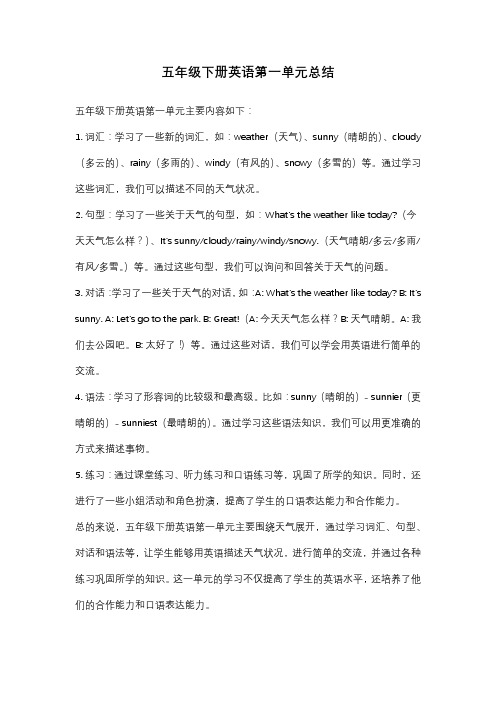
五年级下册英语第一单元总结五年级下册英语第一单元主要内容如下:1. 词汇:学习了一些新的词汇,如:weather(天气)、sunny(晴朗的)、cloudy (多云的)、rainy(多雨的)、windy(有风的)、snowy(多雪的)等。
通过学习这些词汇,我们可以描述不同的天气状况。
2. 句型:学习了一些关于天气的句型,如:What's the weather like today?(今天天气怎么样?)、It's sunny/cloudy/rainy/windy/snowy.(天气晴朗/多云/多雨/有风/多雪。
)等。
通过这些句型,我们可以询问和回答关于天气的问题。
3. 对话:学习了一些关于天气的对话,如:A: What's the weather like today? B: It's sunny. A: Let's go to the park. B: Great!(A: 今天天气怎么样?B: 天气晴朗。
A: 我们去公园吧。
B: 太好了!)等。
通过这些对话,我们可以学会用英语进行简单的交流。
4. 语法:学习了形容词的比较级和最高级。
比如:sunny(晴朗的)- sunnier(更晴朗的)- sunniest(最晴朗的)。
通过学习这些语法知识,我们可以用更准确的方式来描述事物。
5. 练习:通过课堂练习、听力练习和口语练习等,巩固了所学的知识。
同时,还进行了一些小组活动和角色扮演,提高了学生的口语表达能力和合作能力。
总的来说,五年级下册英语第一单元主要围绕天气展开,通过学习词汇、句型、对话和语法等,让学生能够用英语描述天气状况,进行简单的交流,并通过各种练习巩固所学的知识。
这一单元的学习不仅提高了学生的英语水平,还培养了他们的合作能力和口语表达能力。
小学英语五年级下册第一单元知识总结

高层住宅建筑立面设计探析在城市的天际线上,高层住宅建筑如同挺拔的巨人,它们的立面设计不仅影响着建筑的外观美感,还与居住者的生活品质、城市的整体形象息息相关。
高层住宅建筑立面设计是一个综合性的课题,需要考虑诸多因素,如功能需求、美学原则、地域文化、材料技术等。
本文将对高层住宅建筑立面设计进行深入探析,以期为相关设计实践提供有益的参考。
一、高层住宅建筑立面设计的重要性高层住宅建筑的立面是其外在形象的直接展现,具有多方面的重要意义。
首先,良好的立面设计能够提升建筑的美学价值。
在现代城市中,人们对于建筑的审美要求越来越高,一个具有独特风格和魅力的立面可以成为城市景观的亮点,为城市增添艺术氛围。
其次,它有助于改善居住环境。
合理的立面设计可以控制采光、通风,减少噪音和热量的传递,提高居住的舒适度。
再者,立面设计能够反映建筑的功能和品质。
例如,通过立面的处理可以展现住宅的高端定位或者经济适用的特点。
最后,对于城市而言,统一协调而又富有变化的高层住宅建筑立面能够塑造城市的独特风貌,增强城市的可识别性和吸引力。
二、影响高层住宅建筑立面设计的因素(一)功能需求功能是立面设计的基础。
建筑的采光、通风、遮阳等需求都需要在立面设计中得到体现。
例如,大面积的窗户可以增加采光,但同时需要考虑遮阳措施以避免夏季过热。
阳台和露台的设置不仅可以提供户外活动空间,也会影响立面的外观和比例。
(二)美学原则美学原则在立面设计中起着关键作用。
比例与尺度的把握要恰到好处,使建筑在视觉上给人以和谐、稳定的感觉。
对称与均衡的运用可以营造出庄重、整齐的效果,而不对称和动态的设计则能展现出活泼与创新。
色彩的搭配要考虑与周围环境的协调以及对居住者心理的影响,暖色调可以给人温馨的感觉,冷色调则显得宁静。
(三)地域文化不同的地域有着独特的文化传统和建筑风格。
在高层住宅建筑立面设计中融入地域文化元素,可以使建筑更好地融入当地环境,传承和弘扬地域特色。
比如,在南方一些地区,建筑立面可能会采用轻盈通透的设计以适应炎热潮湿的气候;而在北方,可能更注重保温和防风的处理。
英语五年级下册第一单元语法

英语五年级下册第一单元语法以下是英语五年级下册第一单元的语法知识点:1. 现在进行时:表示正在进行的动作或正在发生的事情。
结构:be动词(am/is/are)+动词ing例子:I am playing football.(我正在踢足球。
)2. 动词ing形式:表示正在进行的动作,常与be动词一起使用。
结构:动词+ing例子:running(跑)3. 特殊疑问句:用来对某一事物或情况进行提问。
结构:特殊疑问词+be动词/助动词+主语+动词ing例子:What are you doing?(你正在做什么?)4. 祈使句:表示请求、命令或建议。
结构:动词原形+宾语+其他成分例子:Please help me.(请帮我。
)5. 形容词的比较级和最高级:表示两个或多个事物之间的比较关系。
结构:形容词比较级+than+比较对象形容词最高级+of/in+范围例子:This book is more interesting than that one.(这本书比那本书更有趣。
)The most beautiful place in the world is the Amazon rainforest.(世界上最美丽的地方是亚马逊雨林。
)6. 序数词:表示事物的顺序。
结构:基数词+序数词后缀例子:the first day(第一天)7. 时间表达法:表示具体的时间。
结构:小时+分钟/秒钟例子:at 3:15(在3点15分)8. 介词:表示事物之间的位置关系。
结构:介词+名词/代词例子:in the morning(在早上)9. 副词:修饰动词、形容词或整个句子,表示动作的方式、程度或时间等。
结构:副词+动词/形容词/句子例子:beautifully(漂亮地)。
英语五年级下册知识点整理

译林新版小学五年级下册知识点整理Unit 1知识点一、单词:because 因为 fairy 仙女 fit 合适,合身have to 不得不,必须 leave…behind 留下,丢下mushroom 蘑菇 prince 王子 understand 明白,理解pick 摘,拾 take off 脱下 be bad for有害的clothes 衣服 let 让 put on 穿上 before 在…以前try on 试穿 late 迟的 pick 摘二、词组:at the prince’s house 在王子的房子 be sad 伤心go to the party 去聚会 don’t have any nice clothes or shoes没有漂亮的衣服或鞋子come back 回来 have a good time 过得愉快at the party 在聚会 take off 脱下 try on 试穿 have to go必须走leave…behind 留下,丢下 in the forest 在深林里under a tree在一棵树下 pick a big red mushroom摘一个大红色的蘑菇look so nice 看起来很漂亮 are bad for us 对我们有害的三、句型:Why are you so sad 你为什么这么伤心Because I can’t go to the party. 因为我不能去参加聚会;Why 为什么Because I don’t have any nice clothes and shoes.因为我没有漂亮的衣服或鞋子;四、语法:c an’t = can not don’t =do notUnit 2知识点一、单词:far from 离……远 near 在……附近 by …乘……bus 公共汽车 ,大巴士 on foot 步行 metro 地铁taxi 出租车,的士 bike自行车 plane 飞机 ship轮船train 火车 ride 骑车 show 给……看 basket 篮子city城市二、词组:your new home 你的新家 very big 很大 far from school 离学校远live on Moon Street 住在月亮街上near City Library在城市图书馆附近 come to school 来学校by bus 乘公共汽车 on foot 步行by metro 乘地铁by taxi 乘出租车 a taxi driver 一位出租车司机in the park 在公园里 can fly 会飞 show his bike to sam 展示他的自行车给山姆看too young 太小年龄 sit in the basket 坐在篮子里三、句型:Where do you live 你住在哪里I live…我住在…… I live near/ far from…我住在附近/离远How do you come to school 你怎样来学校的I come to school…我来学校……Unit 3知识点一、单词:along 沿着,顺着 ask the way 问路ask…for help 向……求助full 满的,饱的 get to 到达 next to 在……旁边on your right 在你的右侧; See you later. 一会儿见; traffic light交通灯 turn left向左转 turn right 向右转bookshop 书店 get off 下车 get on 上车take 搭乘 walk 走;步行 street 街道 excuse me劳驾;对不起cinema 电影院 hospital医院 shop商店 zoo动物园supermarket超市 stop车站 over结束二、词组:want to visit 想要参观 get to 到达 get on上车 get off 下车at Park Station在公园站 walk to 走到 next to 在……旁边on the street 在街上 come out from从……出来ask a policeman for help 向一位警察求助 go along this street 沿着这条街走 on your right 在你的右侧 see a new film 看一部新电影wait for the bus 等公交车 take the metro 乘地铁 be over 结束at the traffic lights 在交通灯 turn left向左转 turn right 向右转三、句型:How do I get to …我怎样到达……Go along this street.沿着这条街走;Turn left /right at the traffic lights. 在交通灯向左/右转;Get on/ off …at …在……上/下车;You can see the bookshop on your right.你可以看见书店在你的右手侧;Unit 4知识点一、单词:see the doctor 看医生 feel 感觉 toothache 牙疼 anything 任何东西bedtime 就寝时间 check 检查 dentist 牙医 giraffe 长颈鹿have a rest 休息 point at 指着,指向 should 应该brush one's teeth 刷牙 drink water 喝水take medicine 吃药neck 脖子二、词组:see the doctor 看医生 have a headache 头痛 feel cold 感觉冷let me check 让我检查 have a fever 发烧 have a rest 休息at home 在家 take some medicine 吃些药drink some warm water 喝些温水 eat a lot of sweets 吃许多糖see the dentist 看牙医 too many sweets 太多糖before bedtime 在就寝时间以前 brush your teeth 刷牙三、句型:What’s wrong with ………怎么了I /They have a fever/headache…我/他们发烧/头痛……He / She has a cold/ toothache…他/她感冒/牙痛……What should … do……应该怎么做… should have a rest. …应该休息;四、语法:have → has 三单 shouldn’t = should not tooth → teethUnit 5知识点一、单词:parent 父或母 clean 擦,洗 cook 烧,煮 busy 忙的go away 走了,离开 ladybird 瓢虫 make the bed 整理床铺pest 害虫 sweep the floor 扫地 wash the dishes 洗碗grow 种植 garden 花园 sweet 甜的二、词组:Saturday morning 周六早上 clean the car 擦车 help him 帮他cook breakfast 做早饭 in the kitchen 在厨房 sweep the floor 扫地make the bed 整理床铺cook dinner 做晚饭wash the dishes 洗碗clean the table 擦桌子 eat fruit 吃水果 watch TV 看电视wash clothes 洗衣服 grow grapes 种葡萄 big and sweet 又大又甜go away 走了,离开 so sweet 真甜 in the garden 在花园里三、句型:What are you/they doing 你/他们在做什么I am/They are watching TV. 我/他们在看电视;What is he /she doing 他/她在做什么He/She is sleeping. 他/她在睡觉;四、语法:现在进行时结构:Be + 动词的ing形式;do →doing三种情况:1.直接加-ing 2.双写末尾字母加ing 3.去e加ingUnit 6知识点一、单词:game 游戏,比赛 angry 生气的,愤怒的 drive... away 赶走I can't wait 我等不及了 meat猪、牛、羊等的肉potato马铃薯,土豆 spot 斑,点 tomato 西红柿vegetable蔬菜 win 获胜,赢 yummy 好吃的,美味的smell 有……气味,闻起来 look for 寻找 ready 准备好love 喜爱,喜欢 bread 面包 catch 抓,抓走二、词组:in the evening 在晚上 come home 回家 a football game 一场足球赛his parents 他的父母 smell nice 闻起来香wash some vegetables 洗些蔬菜 some tomato soup 一些西红柿汤cook meat with potatoes 肉煮土豆 I can't wait我等不及了look for 寻找 some juice 一些果汁 apple juice 苹果汁orange juice 橘子汁 a great cook 出色的厨师a lot of pests许多的害虫 come to help 来帮助 drive... away 赶走how many spots 多少个点三、句型:Are you cooking meat 你在煮肉吗No,I’m not. 不,我不是;Is he looking for some juice 他在找果汁吗No, he isn’t . 不,他不是;There is some meat/bread/juice/milk in the fridge.有些肉/面包/果汁/牛奶在冰箱里;There are some potatoes in the fridge. 在冰箱里有些土豆;四、语法:there be 句型中, be动词的形式要看他后面所跟的名词;若是名词单数/不可数名词,则用is;可数名词复数,则用are;tomato -→tomatoes potato -→ potatoesUnit 7知识点一、单词:Chinese New Year 中国农历新年 Double Ninth Festival 重阳节dragon boat race 赛龙舟 Father's Day 父亲节get together 团聚 Mother's Day 母亲节 rice cake 重阳糕rice dumpling 粽子 Dragon Boat Festival 端午节dumpling 饺子 February 二月 festival 节日January 一月 June 六月 May 五月Mid-Autumn Festival 中秋节 moon cake 月饼 mountain山,山脉November 十一月 October 十月 place 地方,地点September 九月 Spring Festival 春节 call 叫作,称作place 地点 old 老的二、词组:Chinese festivals 中国的传统节日 Spring Festival 春节in January or February 在一月或二月Chinese New Year 中国农历新年 get together 团聚eat dumpling 吃饺子 Dragon Boat Festival 端午节in May or June 在五月或六月 dragon boat race 赛龙舟eat rice dumpling 吃粽子 Mid-Autumn Festival 中秋节look at the moon 赏月 at night 在夜里 eat moon cake 吃月饼Double Ninth Festival 重阳节 old people 老人climb mountains 登山 eat rice cake 吃重阳糕Mother's Day 母亲节Father's Day 父亲节 at this festival 在这个节日on the second Sunday of May 在五月的第二个星期天 talk about 谈论a good idea 好主意三、句型:The Spring Festival is in January or February.春节在一月或二月;The Dragon Boat Festival is in May or June. 端午节在五月或六月;What do people du on Mother’s Day 人们在母亲节做什么四、语法:节日、月份这类专有名词单词的第一个字母都要大写:Spring Festival January;月份的英语书写可以缩写到单词的前三个字母:January→Jan.February→Feb. 特殊的September→Sept.Unit 8知识点一、单词:eighth 第八 eleventh 第十一 fight 打仗;打架fourth 第四 hero 英雄 password 密码April 四月 August 八月 birthday 生日December 十二月 July 七月 March 三月together 一起 go shopping 去购物 play 戏剧number 数字 answer 答案 start 开始二、词组:on the eleventh of May 在5月11日 on the eighth of April 在4月8日have a big dinner 吃一顿丰盛的晚餐 with our parents 和我们的父母eat some noodles 吃些面条 play with 和……玩have a great time 玩得很开心 a birthday cake 一个生日蛋糕have a party 举行聚会 at home 在家 play some games 玩些游戏have a lot of fun 玩得很开心 go shopping 去购物open the door 开门 be easy for me 对我来说很容易be good at Math 擅长数学 the first number 第一个数字start fight 开始打仗 run away 逃跑三、句型:When’s your birthday 你的生日在什么时候It’s on the the eleventh of May.在5月11日;四、语法:日期的表达方法:the 日序数词of 月如: the eleventh of May基变序,有规律;词尾加上th ; 一二三,特殊记;词尾字母tdd ,八减t ,九减e ;F要把ve替 ,Ty把 y 变成i,记住th 前有个e;语法点归纳be动词:我用am, 你用are,is连接他,她,它;单数名词用is,复数名词全用are;变疑问,往前提,句末问号莫丢弃;变否定,更容易,be后not莫忘记;疑问否定任你变,句首大写莫迟疑;1.like + 动词ing,如:like swimming2.go + 动词ing,如:go climbing3.how many +可数名词,如: how many watches4.how much + 不可数名词,如: how much water5.序数词前一定加the ,如:the first day6.在几点用at, 如 at 7 o’clock ,在某一天或某一天的具体时间段用on ,如:on Sunday, on Sunday morning, 直接在早上、下午或晚上用in,如:in the morning7.动词后代词用宾格动宾如:join me8.介词后代词用宾格介宾如:with him ,to her9.want to do sth 动词加副词动副,如: dance beautifully 15.some 用于肯定句,any 用于否定句16.There be 在某地有某物强调位置采用就近原则,如:There is a teacher and some students in the classroom.17.不可数名词有:water coffee tea milk juice bread rice food fruit paper chocolate exercise fishpeople18.乐器前加the, 球类前不加the,如:play the piano, play football 19.who当作特殊的第三人称单数;20. 现在进行时结构:Be 动词+动词ing动词变化规则:1.直接加ing , 2.去e加ing , 3.双写末尾字母加ing句型转换否定变化be动词am、is、are+not、情态动词can+ not、助动词do、does + not如何将一个肯定句改为否定句:1、看句中有无be动词,如有,直接在be动词后+ not;2、看句中有无情态动词,如有,直接在情态动词后+ not;3、如都没有,就用助动词+ not;分四个步骤:1位置:肯定句中本来是没有助动词的,要加上去,位置在主语某人或某物后,动词前;2确定助动词用do、does,根据句中动词,动词是原形的助动词就用do,动词是第三人称单数的助动词就用does,3在助动词后加not;4原句中动词发生变化就要恢复成原形;强调一点,有some的要考虑是否要用any;人称代词疑问词。
五年级下册英语1到4单元知识点

五年级下册英语1到4单元知识点Unit 1: Holidays and festivals1. Vocabulary:- Holiday: A day when people do not go to work or school because of a special occasion.- Festival: A special time or event when people gather to celebrate something.- Celebrate: To do something special or enjoyable because of a special occasion.- Parade: A public celebration where people walk or drive along a route.- Costume: Special clothes that people wear for a party or festival.2. Grammar:- Present Simple Tense: Used to talk about habits, routines, facts, and general truths.- Adverbs of frequency: (Always, usually, often, sometimes, rarely, never) Used to show how often something happens.- Wh-questions: Questions that start with words like who, what, where, when, why, and how.3. Skills:- Reading: Understand different types of holidays and festivals around the world (e.g., Christmas, Thanksgiving, Chinese New Year).- Listening: Listen to conversations about holiday plans, traditions, and activities.- Speaking: Talk about favorite holidays and festivals and discuss how they are celebrated.- Writing: Write sentences and short paragraphs about holiday customs and traditions.Unit 2: Travelling1. Vocabulary:- Trip: A journey to a place and back again.- Journey: The act of traveling from one place to another.- Route: A way or course taken in getting from a starting point to a destination.- Vehicle: A machine that transports people or goods.- Sightseeing: To visit places of interest in a city or region.2. Grammar:- Present Continuous Tense: Used to talk about actions happening at the moment of speaking.- Imperatives: Commands or orders used to give instructions.- Prepositions of place: (In, on, at, by) Used to show the position or location of something.3. Skills:- Reading: Understand different types of transportation and travel destinations.- Listening: Listen to dialogues about booking tickets, planning trips, and giving directions.- Speaking: Describe travel experiences, ask for information, and give advice about traveling.- Writing: Write emails or postcards describing a recent trip, including details about accommodation, transportation, and sightseeing.Unit 3: Weather and seasons1. Vocabulary:- Weather: The condition of the atmosphere at a particular place and time.- Season: One of the four periods of the year (spring, summer, autumn, winter).- Temperature: How hot or cold the air is.- Forecast: A prediction of the weather in the future.- Sunny, cloudy, rainy, snowy: Different types of weather conditions.2. Grammar:- Present Continuous Tense: Used to talk about temporary actions happening now.- Comparative adjectives: (Bigger, smaller, hotter, colder) Used to compare two things.- Superlative adjectives: (The biggest, the smallest, the hottest, the coldest) Used to compare three or more things.3. Skills:- Reading: Understand the characteristics of each season and how they affect the weather.- Listening: Listen to weather forecasts, descriptions of seasons, and discussions about dressing for the weather.- Speaking: Talk about favorite seasons, describe typical weather in different seasons, and discuss clothing choices for different weather conditions.- Writing: Write short essays about favorite seasons, create weather forecasts, and describe seasonal activities and events.Unit 4: Animals and habitats1. Vocabulary:- Habitat: The natural home or environment of an animal, plant, or other organism.- Endangered: Threatened with extinction or destruction.- Species: A group of living organisms capable of interbreeding.- Predators: Animals that hunt and kill other animals for food.- Herbivores, carnivores, omnivores: Different types of animals based on their diet.2. Grammar:- Present Simple Tense: Used to talk about habits, routines, facts, and general truths.- Countable and uncountable nouns: Countable nouns can be counted (e.g., animals, trees), while uncountable nouns cannot be counted (e.g., water, air).- How much/many: Used to ask about the quantity of something (how much for uncountable nouns, how many for countable nouns).3. Skills:- Reading: Understand different types of animals and their habitats, including endangered species.- Listening: Listen to descriptions of animals, their behaviors, and their relationships with other animals.- Speaking: Talk about favorite animals, habitats, animal conservation, and animal-related activities.- Writing: Write reports about endangered animals, create posters about animal habitats, and describe animal behaviors and characteristics.。
五年级下册英语Unit1 My day知识点总结复习及练习(含答案) 人教PEP

Unit1 My day知识速递1.重点单词和短语eat breakfast: 吃早饭have…class: 上……课play sports: 进行体育运动exercise: /'eksəsaɪz/ 活动;运动do morning exercise: 做早操eat dinner: 吃晚饭clean my room: 打扫我的房间go for a walk: 散步go shopping: 去买东西;购物take: /teɪk/ 学习;上(课)dancing: /'dɑːnsɪŋ/ 跳舞;舞蹈take a dancing class: 上舞蹈课when: /wen/ 什么时候;何时after: /'ɑːftə/ 在(时间)后start: /stɑːt/ 开始usually: /'juʒuəli/ 通常地;惯常地why: /waɪ/ 为什么always: /'ɔːlweɪz/ 总是;一直busy: /'bɪzɪ/ 忙的need: /niːd/ 需要go swimming: 去游泳win: /wɪn/ 获胜2.语法回顾a. 重点单词:eat breakfast, have…class, play sports, exercise, do morning exercise, eat dinner, clean my room, go for a walk, go shopping, take a dancing class, when, usually, why, always, go swimming, win, need.b. 询问何时做某事:When do you……?例:①When do you get up? (你什么时候起床?)②When do you do morning exercises? (你们什么时候做早操?)③When do they go to school? (他们什么时候去上学?)拓展:When does she eat breakfast?练一练:( ) —When______ you do morning exercises?A. doesB. doC. are( ) —When______ she go to bed?A. doesB. doC. arec. 询问他人周末做什么:What do you do on the weekend?例:①What do you do on the weekend? (你周末做什么?)②What does she do on the weekend? (她周末做什么?)回答:①I usually clean my room. (我通常打扫房间。
五年级下册英语第一单元整理归纳

精品文档五年级(下)Unit 11.单词:run 跑sorry 对不起,不好意思(道歉时用)jump 跳;跳跃sing 唱;演唱dance 跳舞sit 坐down 向下;朝下;沿着stand 站立;直立up 向上;在上面see 看见;明白;会见(过去式为saw)boy 男孩(复数boys)girl(复数girls) 女孩now 现在draw 画picture 图画;图片woman 女人(复数women) talk 交谈;讨论baby 婴儿(复数babies) cry 哭;哭泣;喊叫who 谁sleep 睡觉;入睡man 男人(复数men) hungry 饥饿的water 水tea茶(some tea 一些茶) candy 糖果(some candy一些糖果)train(火车)tree树(复数trees) window 窗户banana香蕉(复数bananas 一根香蕉a banana) dumpling饺子(通常使用的都是其复数形式dumplings)behind 在….之后tired 疲劳的,累的fruit水果(some fruit 一些水果) water 水(some water 一些水)swim游泳happy 高兴的sad 伤心的newspaper报纸paper纸card 卡片,纸牌(复数cards)find 发现,找到2.短语:go straight 直行turn left 左转turn right 右转ride a bike 骑自行车sit down坐下起立stand up站起来look at 看(某人或某物)look out of 从….向外看read the newspaper看报纸read a book /read books看书draw a picture /draw pictures 画画sing a song /sing songs 唱歌play football 踢足球play basketball 打篮球play ping-pong 打乒乓球play cards打扑克(with和…) watch TV看电视do my homework做作业have breakfast吃早餐have lunch吃午餐have dinner 吃晚餐take a picture / take pictures照相fly a kite / fly kites放风筝look out of the window 向窗户外面看wash my face 洗脸wash my hands 洗手make my bed 叠被子,整理床铺句子:3.祈使句:(祈使句是用来表达命令、请求、劝告、警告、禁止等的句子。
- 1、下载文档前请自行甄别文档内容的完整性,平台不提供额外的编辑、内容补充、找答案等附加服务。
- 2、"仅部分预览"的文档,不可在线预览部分如存在完整性等问题,可反馈申请退款(可完整预览的文档不适用该条件!)。
- 3、如文档侵犯您的权益,请联系客服反馈,我们会尽快为您处理(人工客服工作时间:9:00-18:30)。
五年级下册英语第一单元知识点整理五年级下册英语第一单元知识点整理
1、主要单词和短语:
dg ex晨练,做早操
eat breakfast 吃早饭
have English class 上英语课
eat dinner 吃晚饭
pla进行体育活动
eat lunch 吃午饭
climb mountains 爬山
gg 购物,买东西
plaano 弹钢琴
visit grandparents 看望(外)祖父母
go hiking 去远足
二、主要句子:
When do you eat dinner? 你什么时候吃晚饭?
I eat dinner at 7:00vening. 我晚上七点吃晚饭。
When do you get up? 你什么时候起床?
I usually get up at 12:00 a我通常在中午12点起床。
What do you dweekend? 你在周末干什么?
Usually I watch TV and gg. 我通常看电视和购物。
I vgrandparents. 有时候我去看望我的外祖父母。
Ilay football. 我经常踢足球。
I go hiking. 有时候我去远足。
三、重要知识点
同义词:
eat breakfast-have breakfast , eat lunch-have lunch, eat dinner-have dinner pla-dusually- 复数形式:policeman-pollicewoman-policew 现在分词:tell-telling
第三人称单数:say-says
同义句:What do you do ? ---What are you? 你是干什么的?
表示频度的副词:always 总是,一直;usually 通常,常常;often 经常;有时候
以复数形式出现的词组:visit grandpala 介词后跟表示时间的词语时,表示在某年、某月、某个季节,某个时候(在上午,在下午,在晚上)用in;表示在某一天,在星期几用on,在具体的几点几分用at.
too 和either的用法区别:too和either都是“也”的意思,但too用于肯定句,either用于否定句。
